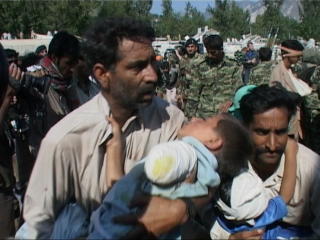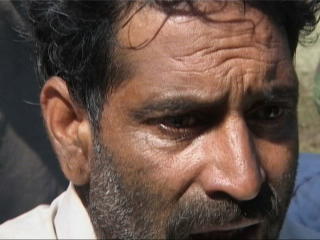


Images of Pain and Desperation
Pakistan Earthquake October 2005
A small hand clinging to a fathers shirt, tilting the camera up you could see that the fathers eyes were clinging to hope, the camera pulls out as the father stands holding the small child clinging to him as he stumbled forwards to the helicopter, the child had only one arm the other stump hung in a bloody bandage, his arm had just been amputated. Mike Tobin wrote these great words to open our package the other night and in one paragraph summed up the tragedy we were both witnessing. Pictures and words that over one million people, would see and hear on the other side of the world in the coming hours.
The earthquake measuring 7.6 on the Richter scale, it lasted six minute’s and killed in excess of 40,000 people more than 65,000 injured and close to 3,500,000 displaced. In the following seven days there has been 575 aftershocks, and Mike never felt one of them and it took a 5.6 in the middle of the night to wake Mark, the team’s Producer.
Numbers mean nothing, when you turn on the camera you can capture a moment a look that sometimes sums up what it must have been like, this assignment has been tough because like the Tsunami there is no enemy, no one to blame, because Mother Nature can be friend and foe in one person.
There was the close up of the little boys face, his eyes black and swollen looking up at the helicopter, the blades casting flickering shadows across his face in time with his heartbeat and suffering. The scene in the helicopter-taking people out injured and maimed 70 of them crammed into the US Army Air Guard Chinook. Every space was full of pain, there was nowhere to sit or kneel for me on the flight back, my feet were wedged between two heads of the injured lying on the floor of the chopper, there black eyes starring up at me then closing.
In the roaring dim of the helicopter, I reached across to Mike and searched thru the backpack we carried between us and found two sports drinks and a couple of granola bars I had packed for emergencies in case we were caught out overnight in the mountains. For some reason my camera had been knocked on and was recording, you could see my arm rummaging and finding the goods then passing them out to the nearest people. They in turned gave them to the most needy, swinging my camera around I zoomed in and caught the woman below my feet having some drink tipped into her mouth. Further down the chopper a man had a spoon and a plastic bottle cut in half with some water in it and he spoon by spoon full was trickling the water into the mouth of whom I assumed was his wife, she was more dead than alive.
You cannot capture the smell of death on camera, and no correspondent has ever found the right words to describe it and neither will I. It is something that pervades the air, covering the Tsunami the air was almost sweet and putrid; here the bodies mangled under concrete for days emitted an odour of fecal decay. When our favourite sports team is about to win, we often say that we can smell victory, the air in the towns and villages of Northern Pakistan smelt of defeat.
At what point as a Photographer covering tragedy do you put down the camera to help the injured, is a question many of us ask ourselves. The answer is somewhat callous and simple. If anyone is to be injured or killed as a result of me not putting down the camera to help them then it is justified to stop filming, but covering events like the aftermath of the Earthquake, there are times when you watch from behind the lens as desperate people struggle to carry the injured and sick on board helicopters. I always stand back out of the way unlike many other photographers who believe that an image is more important than someone else’s child.
I watched as Mike Tobin the correspondent on assignment with me, ran up and down the ramp of the helicopter helping carry the injured, many cynics in this business do this sort of stuff just to put themselves on camera as heroes, but watching Mike that day, he was no hero just another person caught up in this tragedy trying to help.
The best thing I can do as a Photographer is to record the images with as much dignity as I can, to transmit and broadcast these pictures so others may see the plight and realise that here in Pakistan people are hurting and maybe just maybe my images have helped their plight. Professionally there is no greater reward for a Photographer than to have your tape broadcast unedited, just your rushes and FOX did that, for over twenty minutes as we satellited the pictures back to New York the Channel ran them live to air. These are the moments you realise that I did help the victims in my own way.
This is about my twelfth trip to Pakistan for work, from the tumultuous days following 911 to filming exorcisms in desert Temples, sunrises over religious stupas to Friday prayer demonstrations with burning effigies. Trips through the Khyber Pass with armed soldiers for protection to filming child labour exploitation. I have cried as I watched Afghan refugees bury their only baby son, and on this trip seen destruction and scenes that only match the devastation of the Tsunami in South east Asia.
On this trip I have truly marvelled at the spirit of the Pakistani people here to help there fellow countrymen, it is one nation united, the kindness and compassion is everywhere, outside shops University students hand out leaflets listing what you can buy in that store to help the victims, People load cars with supplies that friends get together and drive up into the mountains and hand out food water from the backs of trucks. They are not the UN with their hated brand new Land Cruisers doing yet another fact finding mission, but battered old trucks loaded with goods they pass out to the hands below.
Standing on the backs of these trucks you point the camera down at the hands of small children clawing up in the air hoping that a bottle of water will be passed down. Small hands of five year boys and girls reaching up are powerful and at the same time pitiful images of the despair.
I filmed a small girl maybe no older than four years, who had managed to get a bottle of water sitting in the dirt trying to put it into a tattered plastic bag and thought at the same time this is all this child has in the world, a bottle of water and a plastic bag and yet she had a smile on her face.
As we left Islamabad a storm rolled in and the rain lashed the terminal, lightning and thunder competed like two foes fighting a duel, in the course of a matter of honour. In the mountains around Balakot and hundreds of other villages in the mountains it would be close to freezing, and with no shelter or blankets the death toll will be added to, another small child will be dying as I type this, of exposure. The old will welcome their release from the misery of life as it exists today and greet death as a friend coming to take them away to a better place.
I read my first newspaper in a week, sitting on the plane as we left Pakistan. I often do not read newspapers or watch TV on major assignments. I do not have to compare what I witness to anyone else, it is not a matter of what the competition are doing. I know what we do as a team and nobody competes in human tragedy and misery.
I read an account of a Doctor in Muzaffrabad, (where we filmed the child with one arm clinging) and found myself crying, you can have a cold technical mind whilst working in the field.
You have to, it is the only way to function when surrounded grief and horror. But sitting alone with my thoughts of the images and smells of the last week, I for a short time cried alone in my seat. These are the words that broke me ….
“ fear of death, fear of another earthquake, fear of being buried below the rubble and fear of living “ and I would personally “add fear of being forgotten”.
Mal
Islamabad
Pakistan
October 16 2005

